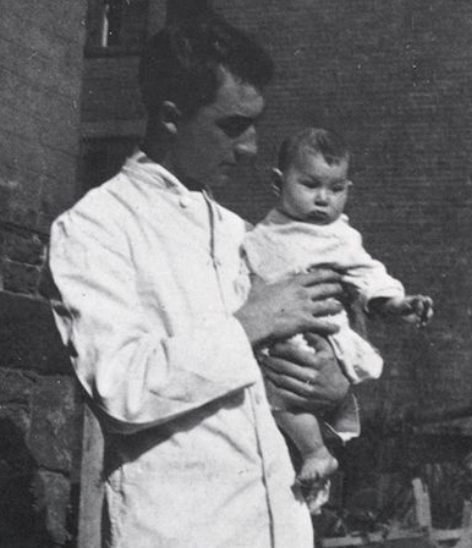Williams Demonstrates the Poetic Can Be Found Everywhere around Us
This year marks the centennial of the famous poem "January Morning" by America's great physician-poet William Carlos Williams (1883–1963). A masterpiece of modernist verse, this poetic sequence — he subtitled it "Suite" — presents moments in his daily life, including his life as a pediatrician and obstetrican at Passaic General Hospital in Passaic, NJ.
"January Morning" first appeared in Williams's book, Al Que Quiere! (1917; "To Him Who Wants It!"; Centennial Edition forthcoming from New Directions). His voice in it remains totally vibrant. The New York Review of Books recently said, "It seems clear that Williams is the 20th-century poet who has done most to influence our very conception of what poetry should do."
The young doctor is dancing with happiness / in the sparkling wind, alone / at the prow of the ferry! — "January Morning"
Williams lived his entire life in Rutherford, NJ, the small town where he was born and raised. It is where he maintained his medical office in his home — where most people knew him simply as "Doc" without knowing he was a man of letters and leader of modernism. He often spent time in Manhattan with fellow artists, crossing the Hudson River by ferry. Al Que Quiere! was his third book but the first to present his unique poetic voice, as found in "January Morning."
All told, Williams published during his lifetime some 20 books of poetry as well as 17 books of prose, including novels, and he delivered more than 3,000 babies. Throughout his career he used his clinical gaze to his advantage as a poet:
|
I I have discovered that most of the beauties of travel are due to the strange hours we keep to see them: the domes of the Church of the Paulist Fathers in Weehawken against a smoky dawn—the heart stirred— are beautiful as Saint Peters approached after years of anticipation. II Though the operation was postponed I saw the tall probationers* in their tan uniforms hurrying to breakfast! III —and from basement entries neatly coiffed, middle aged gentlemen with orderly moustaches and well-brushed coats IV —and the sun, dipping into the avenues streaking the tops of the irregular red houselets, and the gay shadows dropping and dropping. V —and a young horse with a green bed-quilt on his withers shaking his head: bared teeth and nozzle high in the air! VI —and a semicircle of dirt-colored men about a fire bursting from an old ash can, VII —and the worn, blue car rails (like the sky!) gleaming among the cobbles! VIII —and the rickety ferry-boat "Arden"! What an object to be called "Arden" among the great piers,—on the ever new river! "Put me a Touchstone at the wheel, white gulls, and we'll follow the ghost of the Half Moon to the North West Passage—and through! (at Albany!) for all that!" IX Exquisite brown waves—long circlets of silver moving over you! enough with crumbling ice crusts among you! The sky has come down to you, lighter than tiny bubbles, face to face with you! His spirit is a white gull with delicate pink feet and a snowy breast for you to hold to your lips delicately! |
X The young doctor is dancing with happiness in the sparkling wind, alone at the prow of the ferry! He notices the curdy barnacles and broken ice crusts left at the slip's base by the low tide and thinks of summer and green shell-crusted ledges among the emerald eel-grass! XI Who knows the Palisades as I do knows the river breaks east from them above the city—but they continue south —under the sky—to bear a crest of little peering houses that brighten with dawn behind the moody water-loving giants of Manhattan. XII Long yellow rushes bending above the white snow patches; purple and gold ribbon of the distant wood: what an angle you make with each other as you lie there in contemplation. XIII Work hard all your young days and they'll find you too, some morning staring up under your chiffonier at its warped bass-wood bottom and your soul— out! —among the little sparrows behind the shutter. XIV —and the flapping flags are at half-mast for the dead admiral. XV All this— was for you, old woman.† I wanted to write a poem that you would understand. For what good is it to me if you can't understand it? But you got to try hard— But— Well, you know how the young girls run giggling on Park Avenue‡ after dark when they ought to be home in bed? Well, that's the way it is with me somehow. |
* Nursing students.
† WCW's mother, who rejected his modernist poetry.
‡ Street in Rutherford, NJ, near WCW's home.
|
William Carlos Williams practiced pediatrics and obstetrics for over 40 years. He was a physician of immense integrity, who regarded
allegiance to humanism as important as excellence in medical science. He now serves as a role model, and medical students read him
(The Doctor Stories) to learn how he
labored to get the "right picture" of patients — much like artists do with paint on canvas, and photographers with cameras; what
today we call the holistic approach. At Stony Brook Medicine, Williams is read in The Center for Medical Humanities, Compassionate Care, and Bioethics. Established in 2008 to expand and succeed the Institute for Medicine in Contemporary Society, the Center is dedicated to furthering the School of Medicine's long tradition of emphasizing humanism in medical education, and serving as "a place where the human side of medicine is elevated, examined, and revered." |


